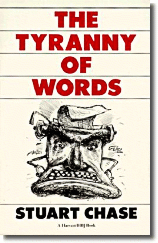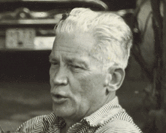
"There are two ways to slide easily through life; to believe everything or doubt everything. Both ways save us from thinking" - Alfred Korzybski
The Chase is Still On
by Joe Sinclair

Chapter 10 of The Tyranny of Words is entitled Interpreting the Environment.
"Here is a man suddenly plunged into a personal crisis, moral, emotional, or financial. Perhaps he has been implicated in a public scandal. Or his young lady has thrown him down. Or he cannot meet his mortgage, due next Friday. Things look black; he is profoundly depressed. No road of escape appears. He begins to generalize with a free use of absolute terms like 'all', 'never', 'always'. 'I can never succeed. I've always been a failure. I can never surmount this difficulty. All my life I've made a mess of things. I'll never pay off that debt. No girl will ever have me. I'll never get over this disgrace. What's the use? Better end it all.'
"Sometimes the poor devil does."
It is really obvious, reading this in Chase's easy-going style, to recognise how influenced was Chase by Korzybski, and how much influence Korzybski had in turn in the development of the Meta Model in Neuro-Linguistic Programming and Transformational Grammar. The Meta Model derives from Korzybski's famed (almost now clichéd) thesis that "The map is not the territory". Transformational grammar relates to the conversion of the deep structures of a language into its surface structures. This derives primarily from Noam Chomsky's studies in the 1960s.
The Meta Model describes linguistic patterns that limit the growth or therapeutic development of an individual. One of the ways it operates is through the use of language that deletes, distorts or generalizes.
I find it amazing that this, starting with Korzybski, continuing with Chomsky, then being developed by John Grinder and Richard Bandler in the 1970s into Neuro-Linguistic Programming, was anticipated so well by Stuart Chase in the 1930s. Let's return to his Tyranny of Words:
"What has been happening to his ['the poor devil'] mind? He has been generalizing from inadequate referents . . . He thinks this unfortunate 'time' is all 'times' . . . He believes this case is identical with all past and future cases in his life. He sees this woman as all women, this debt as all debt, this disgrace as an eternity of disgrace."
Chase continues this theme by acknowledging the debt that semantics and therapy owe to 'the pioneers' such as Korzybski, each of whom "has contributed valuable material which, in combination, certainly gives us an introduction to a science . . . from which a mature discipline may presently develop."
I have never ceased to be amazed at how little credit has been given to Stuart Chase by 'the later pioneers' whose work was so anticipated by this man. Perhaps he was too "popular" a writer for the erudite and academically biased semanticists and therapists that followed him chronologically.
Chase, in Chapter 10 of The Tyranny of Words, lists 15 'deductions' that appear to be uncontentious in the developing semantic discipline, that may be summarised as follows:
1. That words are not things.
2. That words mean nothing in themselves; they are as much symbols as are x and y.
3. That meaning in words arises from context of situation.
4. That abstract words are especially liable to spurious identification.
5. That things have meaning to us only as they have been experienced before.
6. That no two events are exactly similar.
7. That finding relations between things is more dependable than trying to deal in absolutes.
8. That mathematics is a useful language to improve knowledge or communication.
9. That the human brain is a remarkable instrument for clear communication.
10. That new words are not needed to improve communication, but better use of the words we have. [He does, however, suggest structural improvement in language.]
11. That the scientific method is applicable to the study and improvement of communication.
12. That the formulation of concepts upon which men can agree is a prime goal of communication.
13. That academic philosophy and formal logic have hampered rather than advanced knowledge and should be abandoned.
14. That simile, metaphor, poetry, are legitimate and useful methods of communication, provided speaker and hearer are aware they are being employed.
15. That the test of valid meaning is: first, survival of the individual and the species; second, enjoyment of living during the period of survival.

Some years ago I wrote an article for Nurturing Potential (Issue 16) based on Stuart Chase, that stated:
"Hardly anyone - at least amongst my acquaintances - seems to have heard of Stuart Chase. Yet, during his lifetime, and particularly in the years prior to World War II, Stuart Chase was a widely read and highly respected figure in several fields, notably that of communication. He has been described as "the first writer to reduce to the language of the layman the interesting science of clarifying the meaning of words", i.e. semantics."Some of his "pithy" observations are well worth repeating:
Attitude is your acceptance of the natural laws, or your rejection of the
natural laws.
Sanely applied advertising could remake the world.
The very first law in advertising is to avoid the concrete promise and cultivate
the delightfully vague.
Traditional nationalism cannot survive the fissioning of the atom. One world or
none.
Democracy, as has been said of Christianity, has never really been tried
I thoroughly recommend that you acquaint yourselves with this wonderful man via the Internet. His books are also still available through Amazon, EBay, or any of the other online book purchasing services.